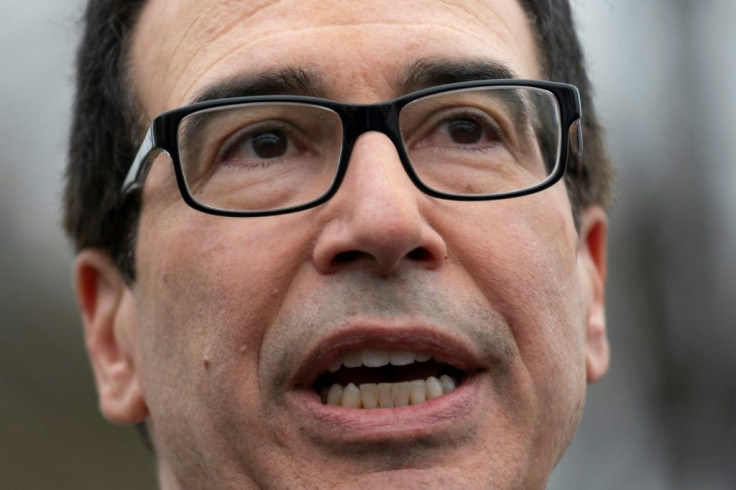Coronavirus Job Losses: Mnuchin Warns Of Great Depression-Level Unemployment

KEY POINTS
- The administration is proposing $250 billion be put in the hands of Americans to try to mitigate the impact of the coronavirus
- Mnuchin warned senators that if they fail to act, unemployment could hit 20%
- Markets are continuing their downard slide with the Dow poised to wipe out all gains since Trump's election
Update: 12:05 p.m.
An NPR/Marist poll released Wednesday indicates 18% of Americans already have lost their jobs or are working reduced hours as a result of the virus.
Original story
Treasury Secretary Steven Mnuchin is warning U.S. unemployment could soar from a low 3.5% to 20% as the coronavirus pandemic forces businesses to close, wiping out an estimated 1 million to 3 million jobs.
Mnuchin headed for Capitol Hill on Tuesday to brief lawmakers on the administration’s economic stimulus proposals, including sending $1,000 to every adult except millionaires, about $250 billion, within the next two weeks to mitigate the effects of the of the spreading virus, which has infected more than 6,500 Americans and killed at least 107.
Mnuchin warned Senate Republicans if no action is taken, unemployment could soar to 20%, approaching the 24.9% rate seen at the height of the Great Depression. More recently, unemployment peaked at 10.2% in October 2009 during the Great Recession.
Analysts at Morgan Stanley and Goldman Sachs said recently a global recession already is underway and growth in the U.S. would come to a standstill this year as a result of the pandemic, with the U.S. economy contracting as much as 5% next quarter.
Economist Paul Krugman questioned Mnuchin's estimate, saying it would require a 30% drop in gross domestic product, in which case the stimulus package being proposted by the administration would be grossly inadequate.
Mnuchin warns of 20% unemployment. That would require something like a 30% fall in GDP, in which case proposed stimulus wildly inadequate. On the other hand, he may have just invented a number out of thin air, with no understanding of what it means 2/ https://t.co/4ywrVI0Vts
— Paul Krugman (@paulkrugman) March 18, 2020
Financial markets around the world have crashed, with the Dow Jones Industrial Average poised to wipe out all of its gains since Donald Trump’s election in 2016.
The travel and hospitality industries already are reeling with restrictions on travel and orders by governors in nearly two dozen states closing bars and restaurants to the public.
“I wouldn’t be one bit surprised if when we look back at the data, it is decided ... that the recession started in March,” Alan Blinder, a former Federal Reserve vice chairman and currently a professor at Princeton, told CNBC.
Layoffs began rippling through the economy in early March and were accelerating as the virus spread. The March unemployment report is due to be issued April 3. Some 158.8 million Americans had jobs in February with 5.8 million more looking for work.
“We will definitely see an effect on jobs from the coronavirus, and it could be pretty large in leisure and hospitality,” Julia Pollak, labor economist at ZipRecruiter, told the Washington Post. “The first thing we’ll see is a reduction in hours. We hear many reports of employers canceling staff everywhere except in healthcare.”
© Copyright IBTimes 2024. All rights reserved.






















